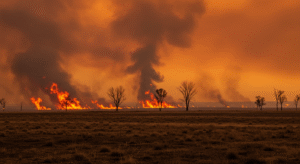 A study by the Helmholtz Centre for Environmental Research (UFZ) and Australian researchers reveals that climate change is increasing the risk of wildfires globally. Specifically, the overlap of “fire weather” seasons conditions conducive to wildfires is growing between eastern Australia and western North America. This synchronization heightens the likelihood of simultaneous large scale wildfires across continents, complicating international firefighting efforts.
A study by the Helmholtz Centre for Environmental Research (UFZ) and Australian researchers reveals that climate change is increasing the risk of wildfires globally. Specifically, the overlap of “fire weather” seasons conditions conducive to wildfires is growing between eastern Australia and western North America. This synchronization heightens the likelihood of simultaneous large scale wildfires across continents, complicating international firefighting efforts.
Historically, regions like the west coast of North America and the east coast of Australia have suffered devastating wildfires. For instance, in January 2025, Los Angeles experienced a wildfire that destroyed over 10,000 buildings and resulted in 29 fatalities. Similarly, between September 2019 and March 2020, eastern Australia faced one of its worst bushfires, burning more than 12 million hectares of land. These events underscore the increasing challenges posed by overlapping fire seasons.
The study emphasizes the need for enhanced cross-border collaboration among fire services in countries like Canada, the U.S., and Australia. As fire seasons become more aligned due to climate change, coordinated international strategies are essential to effectively manage and mitigate the impacts of simultaneous wildfires.
Source: Environmental News Network
